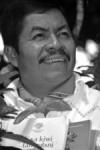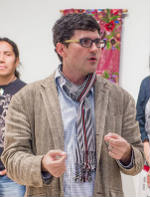Lalakgamakglhtit
¿Lantla chu nakwanikgó ninín
pi nelh xkataxawatkán tani aknukgó?
lantla nakwanikgo ninín
pi lakatunu nakaxtlawananikgokán.
¿Pi niktilakamaxnalh chu
akxni nelh kititakgskgolh
xa tiji xanat?
Lantla nakwanikgó ninín
pi wa imá lilhtampan chu kgalhpuxum
nelh kitilichiwinankgolh xlatamatkán.
¿Ni naktakgalhchiwinankgó?
¿tu nkiwi naliskgakgaw?
pi aya tapuxtakgamikanit nkinakukán.
¿Lantla nakwanikgó ninín
pi lata xkinkatasnikgoyan kpaskwa kumpana
uku chu tlakgmaka lakampi na anaw
liakgwanaw wantu kinkamakglhtipatankanán?
¿Tu xanat nalimastlanikgo xmaknikán?
¿tu limajinin, tu liamkgskgo
nalikamakgskgokgó kxtijikán?
¿Ni kitiyat lakum xanat napulhtakipalakgó
akxní naktasanikgó?
wanti kinkamakglhtipatankgoyan kintiyatkán
xtachaná chakalh yakgolh kkintamputsnikán.
Removal
How can I tell my dead
that this is no longer their land,
that they’ll have to look
for offerings somewhere else?
How can I face them
when the road of flowers
is no longer there,
when the crosses made of sempoalxochitl
no longer
tell their stories?
Where can we speak with them?
Under what tree?
My heart is already a desert.
How can I explain
that the ringing bells aren’t calling us
to celebrate,
but to defend what little we have left?
What flowers will greet their shades?
What incense, what candles
will illuminate their path?
Where will the flowers spring
when I call them,
how will the flowers sprout
if greed is worm
feasting on their umbilical cords?
Lilhka’
Xtachaná mpala paks lipatsankgayaw ntiji’
kintankgaxekgakán, kintachiwinkán, kinkilhtsukután,
nimakgantuxtí xtamalaknún kimpuchinikán
maski tlakg anán liwat xakilhtutu’, nimakgantuxtí.
Lakgkurus ya ntasiyú ntalimaxkgat, talipuwan,
talhkatawalanit kkakukuni’xtantun tatsinksat.
Lu nipaxawá skgolí wun, na nikatsí taní na an,
lakgsputtilha xatachiwín kilatamatkán, lakgsputtilhá,
maski lu makgasá tsokgsamaw, maski laxakgatlipatanaw,
niamalakgsputuyaw wantu kinkamapitsiyán.
Borders
It seems all roads lead to forgetfulness,
to losing our roots, our language,
our essence, to the horizon, abundance
being the promise of a lying god.
The landscape wears poverty like a cross,
hunger a line of footprints in the sand.
Confused, the wind whistles its deep loneliness
as echoing our history fades,
we’ve lived in vain, in vain,
scratching the wall dividing us.
Lichiwinankgoy lapaxkit ninín
Lichiwinankgoy lapaxkit ninín
lilakgastakgwanankgoy nkiwi,
nachiwinankgoy likaxtlawan kgalhpuxum
tipalhuwa tachiwín lichiwinankgó.
Lantla lamakgolh ti katsekg lapaxkikgó,
lantla mastay xtapaxkín kgalhtuchokgo,
lata chan kpupuná’.
Lichiwinankgoy lapaxkit ninín
niakxnikú niy xnakukán,
jalhanankgoy kxpulakni kataxawat,
makgawanikgoy xaspinini kgalhni’,
xlakata wa lapaxkit xaxlipán.
Lichiwinankgoy lapaxkit ninín
lapulakgoy makgwananín,
likankalay talakgxtamit putaknún,
tachayaway latsukat kkakapeni’,
kkapuxkgán, kkasekgnán,
tachayaway latsukat.
Lichiwinankgoy lapaxkit ninín,
lalipaxkikgóy xasasti tapaxkín
antani likaxtlawanankanit nkgalhpuxum.
Lichiwinankgoy lapaxkit ninín,
mapixnukgó xanat xtalakapastakanikán,
nilinipatankgóy lantla
xakstukán taakgxtakgtamakgonít.
The dead talk about love
The dead talk about love
trees feed on their flesh
the crosses made from sempoalxóchitl
tell thousands of stories.
They talk about clendestine unions
about rivers that exhaust themselves inland,
about rivers that surrender themselves to the sea.
The dead tallk about love
their hearts never die,
but beat in the earth
pumping plum-colored blood
because love is a perrenial.
The dead talk about love
their desires wander around,
the graveyards smell like sex,
kisses evaporate in the humidity
of coffee plantations, ravines, banana groves.
The dead talk about love
inventing new embraces
at the altars of sempoalxóchitl.
The dead talk about love,
wearing memory’s flowered necklace.
The dead
refuse to to die forgotten.
Translated by Paul M. Worley





